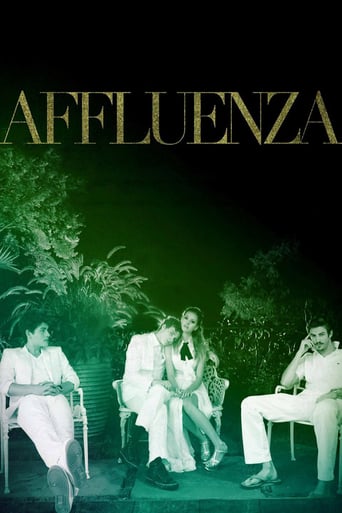tieman64
Kevin Asch directs "Affluenza". A portmanteau of "affluence" and "influenza", the film's title is a word recently coined by critics of consumer capitalism. It generally refers to the physical and psychological ramifications of stress, overworking, debt and hyper-consumption. As of 2013, it has also been used in legal circles to refer to those from wealthy backgrounds who "suffer" from an inability to comprehend the ruinous consequences of their actions.Loosely based on F. Scott. Fitzgerald's "The Great Gatsby", "Affluenza" opens in an expensive looking skyscraper. Young Fisher Miller (Ben Rosenfield), a budding photographer, is being berated by Mister Carson (Roger Rees), a billionaire alpha male. Carson teaches Fisher the "law of the jungle", the "benefits of hunting" and ridicules Fisher for being part of a "pampered and coddled generation". Carson then mocks Fisher's photographs, which he states "do not represent the rise of a new generation", but represent the "decline of a pathetic, entitled generation".Who exactly reeks of entitlement becomes the chief inquiry of Asch's film. It watches as Fisher, whose father is a broke guy called Ira (Danny Burstein), moves in with his uncle Philip. Wonderfully played by cult favourite Steve Guttenberg, Philip's an ultraconservative multi-millionaire who is in the "business of making money". Philip tries to mould Fisher into a "go getter" and "businessman", but Fisher resists. He's an artist.Interestingly, Asch both sympathises with and condemns Philip. On one hand, Philip values "hard work", respect and etiquette ("No phones at the table!"). On the other, he's obsessed with business portfolios, mansions, credit card bills, disrespects maids and the lower classes and berates his brother for being gay and "not a real man". Like all the other millionaires within Asch's film, Philip's also constantly accusing others of being "irresponsible", yet admits no blame when the irresponsibilities of the upper and ruling classes "cause" an economic meltdown during the film's climax.Like Oliver Stone's "Wall Street", "Affluenza" thus finds a kid, Fisher, caught between two father figures. Ira's raised an artist and weed smoker, Philip wants to raise another Master of the Universe. Fisher oscillates between the duo, simultaneously seduced by wealth and disgusted by the facile rules, mores and rituals of the upper classes."Affluenza's" second half watches as Fisher befriends Dylan Carson (Gregg Sulkin), a wealthy playboy. In his relationship with Dylan, Fisher becomes aware of the subtly parasitic workings of Dylan's circle of friends and acquaintances. These are all characters who use Fisher for his access to marijuana, for his access to beautiful cousins, who show no real interest in Fisher's feelings or possessions (they callously break his camera) and whose notions of popularity, worth and friendship hinge entirely on money. In short, all are oblivious to the ways in which the devaluation of the human world increases in direct relation to the increase in value of the world of "things".Dylan, like Philip, is nevertheless granted our sympathies. He is genuinely lovestruck, genuinely cares for Fisher's cousin, he honours his promises to Fisher, he is emotionally fragile, has a puppy-dog neediness about him, and we're always aware that even smug goofballs like Dylan are products of their environment."Affluenza" climaxes with three symbolic events. In the first, Fisher gets a close look at how power works: Dylan bribes an admissions officer so that Fisher may get into an art school. Feigning sincerity, we watch as a teacher at the school assures Fisher that she is "rooting for him getting into her class". That same teacher delivers a lecture on the relationship between politics and photography, and the presumed power of the image to "change the world". Referring to a slide-show which features activists and civil rights movements, she portentously asks: "These generations tried to save the world, but did they succeed?" In a film awash with "blood for oil" posters, Obama slogans and lug-headed economists yapping on radios, the answer to the teacher's question seems a resounding "no". The civil-rights era led to but a more entrenched form of neoliberal capitalism, whose cycles of booms and busts pepper the film's last act. Set during the 2008-12 financial crisis, Asch thus has his cast of millionaires suddenly go broke, die of heart attacks, suicide or arrested for fraud. What exactly their occupations and "dirty deeds" were, we don't know, though Dylan himself hints that they may merely be products of an inherently corrupt system. An absurd system in which global debt must outpace money, and so to the knock-on effects of scarcity, poverty, crime, inequality and bankruptcy. "Isn't it funny," Dylan says, "that the federal government which is technically bankrupt administers the bankruptcy laws?" "People are going to rise up and come looking for a piece of the pie," Dylan tells Fisher, before adding: "They won't get it, but that's what you have to photograph." The film then revisits its opening scene, we the audience now armed with the knowledge that Mister Carson is broke and his family dead or shattered. "What's the use having money but no love?" Fisher, in a horribly clichéd sequence, challenges."Affluenza" ends with half its cast happy and half its cast sad. The rich are weeping and the lower classes are assembling at a hokey party, in which green, hippie and liberal values are touted. This is where happiness lies, Asch says, the film unable to think beyond vague 1960s-styled alternatives. Regardless, scientists have themselves now started charting the links between the mental health of populaces and the economic organisation of society, and increasingly data from WHO studies are demonstrating clear correlations between social inequality and emotional distress. 1957, after-all, was the year the percentage of Americans describing themselves as "happy" reached a peak never to be exceeded for the rest of the 20th century.7.9/10 – Underrated. See "The Canyons" (2013) and "The Swimmer" (1968).

